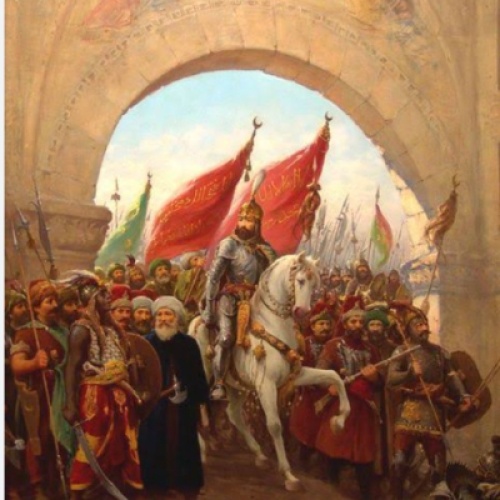Hazrat Umar (R.A), otherwise called Umar al-Farooq, was brought into the world in 583 CE in Mecca, Arabia. He was an individual from the Adi faction of the Quraysh clan, which was an unmistakable clan in Mecca.
_Early Life_
Hazrat Umar was naturally introduced to a well off family and was raised with the customary upsides of the Qurayshi clan. He was known for his solidarity, grit, and knowledge since early on. Prior to embracing Islam, Hazrat Umar was a gifted hero and a fruitful vendor.
_Change to Islam_
Hazrat Umar's change to Islam is a wonderful story. At first, he was a savage rival of Islam and the Prophet Muhammad (PBUH). Be that as it may, after his sister Fatima transformation, he was moved by her devotion and confidence. At some point, while en route to kill the Prophet Muhammad (PBUH), he experienced a Muslim who recounted refrains from the Quran. The expressions of the Quran significantly affected Hazrat Umar, and he pronounced his confidence before the Prophet Muhammad (PBUH).
_Relocation to Medina_
In 622 CE, Hazrat Umar relocated to Medina with the Prophet Muhammad (PBUH) and different Muslims. This occasion denoted the start of the Islamic schedule. In Medina, Hazrat Umar assumed a pivotal part in the early Islamic people group, taking part in fights, prompting the Prophet Muhammad (PBUH), and assisting with laying out the Islamic state.
_Caliphate_
After the demise of the Prophet Muhammad (PBUH) in 632 CE, Hazrat Abu bakar(R.A) turned into the main Caliph of Islam. At the point when Hazrat Abu bakar (R.A) died in 634 CE, Hazrat Umar (R.A) succeeded him as the second Caliph of Islam.
_Administration and Reforms_
As Caliph, Hazrat Umar presented a few changes that changed the Islamic state. He laid out a discussion panel, regulatory divisions, a legal framework, a public depository, and social government assistance programs. His administration was set apart by decency, balance, and sympathy.
_Triumphs and Expansion_
During Hazrat Umar's caliphate, the Islamic realm extended quickly, overcoming domains in the Byzantine Domain, the Persian Domain, Egypt, Iraq, Palestine, and Syria. His tactical missions were set apart by astounding triumphs, remembering the catch of Jerusalem for 638 CE.
_Individual Life_
Hazrat Umar was known for his effortlessness, modesty, and devotion. He carried on with a humble life, wore straightforward dress, and spent his evenings in supplication. He was an equitable and fair pioneer, cherished by his kin, and dreaded by his foes.
_Martyrdom_
Hazrat Umar (R.A) was martyred in 644 CE by a Persian slave named Abu Loloo. He was cut while driving the morning petition in the mosque of Medina. His passing was a shock to the Muslim people group, and he was prevailed by Hazrat Usman (R.A) as the third Caliph of Islam.
_Legacy_
Hazrat Umar's heritage is a demonstration of his exceptional person, initiative, and vision. He assumed a critical part in molding the Islamic state, extending its boundaries, and laying out an equitable and fair society. His obligation to equity, empathy, and reasonableness has motivated ages of Muslims, and his memoir stays a wellspring of direction and motivation for individuals all over the planet.
_Early Life_
Hazrat Umar was naturally introduced to a well off family and was raised with the customary upsides of the Qurayshi clan. He was known for his solidarity, grit, and knowledge since early on. Prior to embracing Islam, Hazrat Umar was a gifted hero and a fruitful vendor.
_Change to Islam_
Hazrat Umar's change to Islam is a wonderful story. At first, he was a savage rival of Islam and the Prophet Muhammad (PBUH). Be that as it may, after his sister Fatima transformation, he was moved by her devotion and confidence. At some point, while en route to kill the Prophet Muhammad (PBUH), he experienced a Muslim who recounted refrains from the Quran. The expressions of the Quran significantly affected Hazrat Umar, and he pronounced his confidence before the Prophet Muhammad (PBUH).
_Relocation to Medina_
In 622 CE, Hazrat Umar relocated to Medina with the Prophet Muhammad (PBUH) and different Muslims. This occasion denoted the start of the Islamic schedule. In Medina, Hazrat Umar assumed a pivotal part in the early Islamic people group, taking part in fights, prompting the Prophet Muhammad (PBUH), and assisting with laying out the Islamic state.
_Caliphate_
After the demise of the Prophet Muhammad (PBUH) in 632 CE, Hazrat Abu bakar(R.A) turned into the main Caliph of Islam. At the point when Hazrat Abu bakar (R.A) died in 634 CE, Hazrat Umar (R.A) succeeded him as the second Caliph of Islam.
_Administration and Reforms_
As Caliph, Hazrat Umar presented a few changes that changed the Islamic state. He laid out a discussion panel, regulatory divisions, a legal framework, a public depository, and social government assistance programs. His administration was set apart by decency, balance, and sympathy.
_Triumphs and Expansion_
During Hazrat Umar's caliphate, the Islamic realm extended quickly, overcoming domains in the Byzantine Domain, the Persian Domain, Egypt, Iraq, Palestine, and Syria. His tactical missions were set apart by astounding triumphs, remembering the catch of Jerusalem for 638 CE.
_Individual Life_
Hazrat Umar was known for his effortlessness, modesty, and devotion. He carried on with a humble life, wore straightforward dress, and spent his evenings in supplication. He was an equitable and fair pioneer, cherished by his kin, and dreaded by his foes.
_Martyrdom_
Hazrat Umar (R.A) was martyred in 644 CE by a Persian slave named Abu Loloo. He was cut while driving the morning petition in the mosque of Medina. His passing was a shock to the Muslim people group, and he was prevailed by Hazrat Usman (R.A) as the third Caliph of Islam.
_Legacy_
Hazrat Umar's heritage is a demonstration of his exceptional person, initiative, and vision. He assumed a critical part in molding the Islamic state, extending its boundaries, and laying out an equitable and fair society. His obligation to equity, empathy, and reasonableness has motivated ages of Muslims, and his memoir stays a wellspring of direction and motivation for individuals all over the planet.







